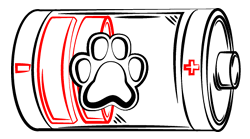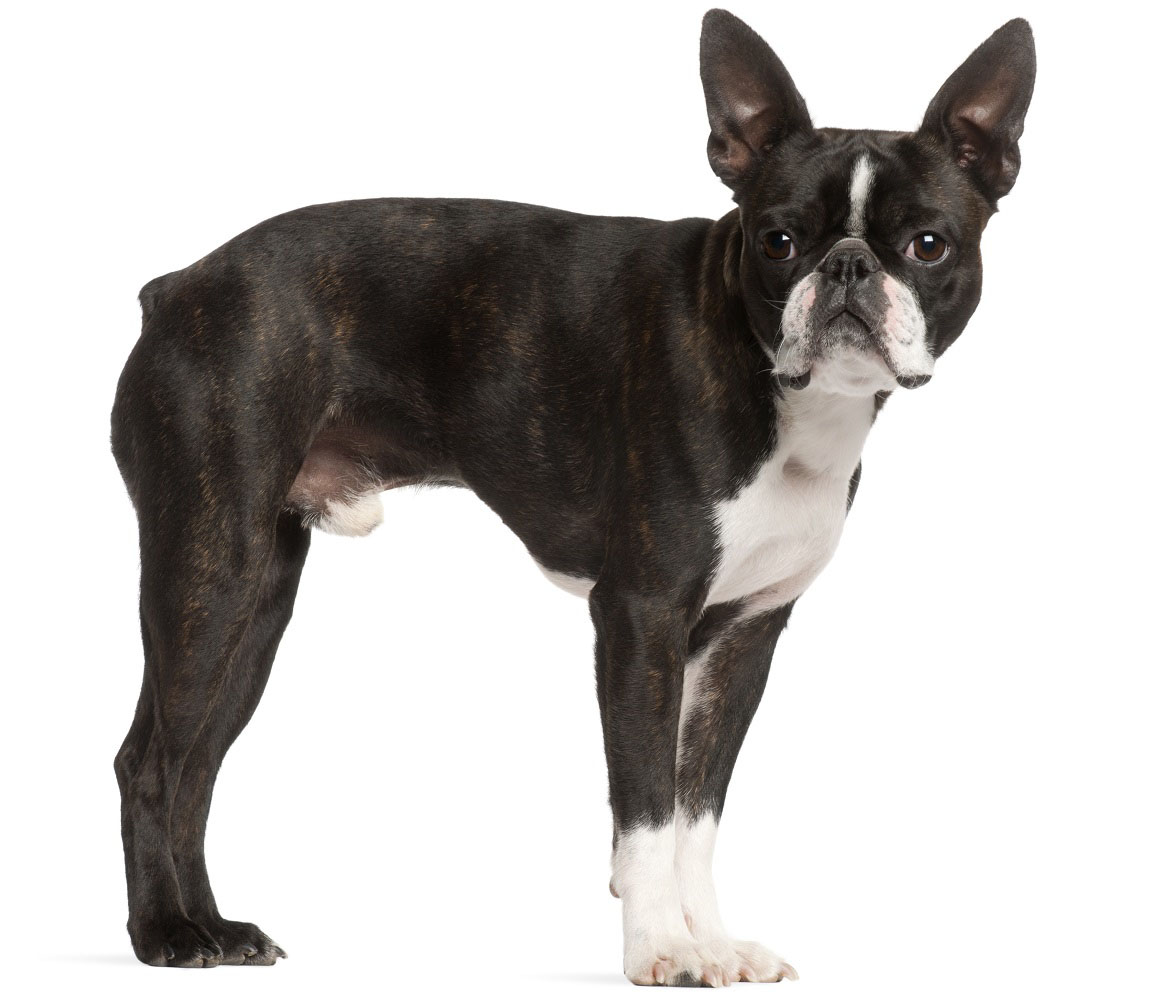
Paws ‘N’ Pups Quickview
Size
| Energy Level
| Trainability
| Paws ‘N’ Pups Rank
|
Characteristics
| Physical Characteristics: Height: 12-15” Weight: 10-25 lbs. Energy Level: Moderate | The American Kennel Club recognizes the Boston Terrier in the following colors:
|
| Health & Longevity: 12-15 years Breeders screen for the following conditions:
Boston Terriers, sometimes known as Boston Bull Terriers, experience the same difficulties as other short-nosed (brachycephalic) breeds; they cannot tolerate temperature extremes. Their shortened muzzles make it difficult for them to cool themselves in warmer temperatures; high humidity makes this even more difficult. In higher temperatures, these dogs must be housed in air conditioned homes with free access to water. Exercise, including walks, must be provided only during early morning or nighttime when temperatures are lower. It is recommended that Bostons be walked on a harness rather than a collar to avoid putting any additional pressure on the airway. Allergies are also common, which can express themselves in many ways; ear infections, skin itchiness and chewing, hot spots, and gas. Brain tumors exist, as does megaesophagus. | |
Temperament & Train-ability
Playful, loveable, spirited but gentle…Boston Terrier devotees loudly sing the praises of their sturdy companion dog. Small but not yappy and very social by nature, Bostons are a good choice for apartments, condos, and those with small yards. Novice dog owners will not be overly challenged owning a Boston, and they make wonderful companions for seniors. Most Bostons get along well with other dogs and meet strangers happily. Some Bostons (males especially), however, exhibit a more fiery, terrier attitude; careful introduction and management around other dogs may be needed for these individuals. They usually make good family dogs, being small enough not to knock over little ones, yet sturdy enough for children. Just as your dog will need careful socialization to learn appropriate behavior around children, your children must be taught how to properly interact with your Boston. Never allow children to pull ears, poke eyes, etc. Children should be taught how to recognize when a dog needs a break and give them space. The moderate exercise needs of a Boston are easily satisfied with 20-30 minutes of play in the house or garden, or a walk around the neighborhood, although some will have higher exercise needs. Bostons are usually on the inactive side indoors.
Boston Terriers do not tolerate temperature extremes; they will need protection from the cold and heat; they cannot be housed outdoors. Their prominent eyes are susceptible to injury, so care should be taken to provide protection by not allowing your Boston to run through shrubbery, etc. Bostons can be noisy, producing their own unique variety of snorts, grunts and snores; they also can produce varying degrees of gas and drool.
Training a Boston Terrier is an easy, fun process; their intelligence combined with their sociability makes for a willing partner. To assure the process is enjoyable as well as effective, take a low key, positive approach to training. Positive reinforcement methods are preferred over harsh, punitive ones. Explain what you want through praise and rewards, and you will see results. Punishment will only shut down your Boston and erode their trust in you; spend your valuable time together explaining and rewarding what you want rather than focusing on what you don’t want. The use of a harness is preferred over a collar for walking and training, as it will reduce potentially harmful pressure on the dog’s airway.
Boston Terriers are not known for being highly competitive in dog sports, but there is no reason you cannot enjoy the bond-enriching qualities of training with a Boston. Accept them for what they are and look for activities in which they display a natural aptitude. Your sweet social butterfly may enjoy therapy dog work; your outgoing show-off might live to perform tricks for people.
Grooming
The Boston Terrier is an easy care breed. Their smooth coat sheds minimally and is easily kept healthy by weekly brushing with a curry or soft bristle brush to help remove any dead hair and promote circulation; a monthly bath will keep your Boston fresh. Care should be taken to keep any wrinkles and skin folds clean and dry or they can become havens for bacteria to grow. Ears must be cleaned regularly, and toenails will need to be trimmed, as most Bostons will not wear their nails down even if walked on concrete. Teeth should also be checked and cleaned as necessary, and eyes should be examined daily.
Diet
Most Bostons will eat about 1/2-1 1/2 cups of food per day, fed in two meals; free feeding is not recommended as Bostons can easily become overweight. The amount fed can vary depending on age, activity level, and type of food fed. A high quality diet will produce the best results, but one should avoid a high protein diet as these are typically better suited to more active dogs and can cause problems for Bostons. If food-related allergies and sensitivities surface, some experimentation may be needed to find a food that your dog tolerates. It is common for Boston Terriers to experience more than the average amount of gas. Regular exercise is important to keep your Boston from becoming overweight. The good news is that a nice walk around the neighborhood is usually sufficient. Clean, fresh water should always be available.
Looking for a Boston Terrier?
 Find A Boston Terrier Breeder |  Boston Terrier Puppies For Sale |  Adopt A Boston Terrier |
Cost
Prices typically range between $1,000-$2,000. Although sometimes purchase costs are less than this, one should carefully consider the potential health issues and related veterinary expenses when health screenings have not been done. Breed rescue groups provide screening and re-homing of dogs that, through no fault of their own, have lost their homes. Adoption fees vary, with an average fee of $400-$700. Be cautious when breeders advertise “rare” colors, as it is often nothing more than a marketing ploy to charge top dollar. Also, many breeders who specialize strictly in non-accepted colors do not place a high priority on the health of their animals; the price tag and sale are their priorities, so do your research and ask questions.
With airline restrictions on flying brachycephalic dogs, it may be necessary to add considerable travel expenses and driving time to get your new dog home. As with many purchases, the initial purchase price of any dog is only the beginning of the money you’ll spend. Buying supplies, food, and regular vet visits all add up; even in well-bred dogs, it is common for Bostons to have a fairly high need for regular vet care.
Paws ‘N’ Pups Ranking
Paws ‘N’ Pups ranks every breed out of 4 with 1 being easiest to integrate into your life and 4 being the toughest – The lower the ranking the better.
Ranking takes into account a few basic factors such as cost, skill level needed, high vs. low maintenance, and how critical regular training is to success.
The Boston Terrier rates 3, due primarily to their cost and many physical challenges, which make for an overall high level of maintenance.
Breeds Similar To Boston Terrier
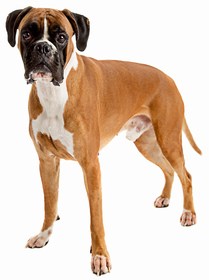 Boxer | 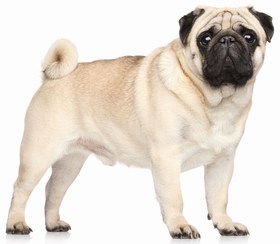 Pug | 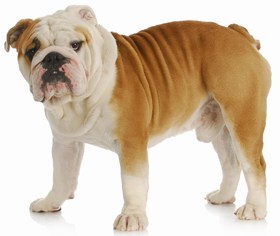 English Bulldog | 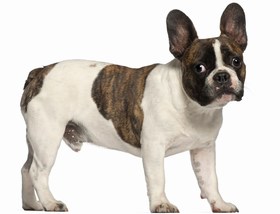 French Bulldog |


